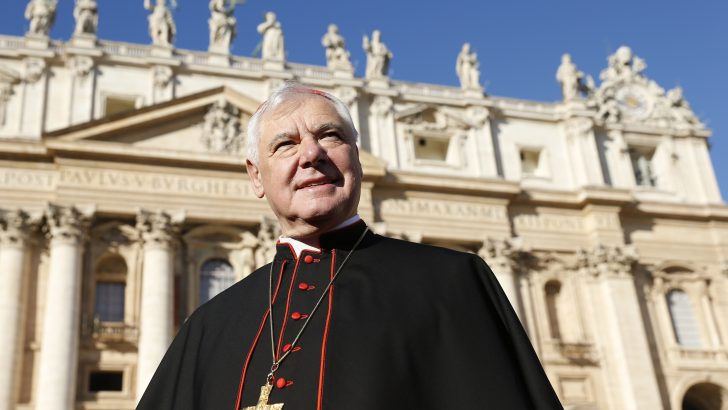Muted reactions to statements from Cardinal Gerhard Müller are highly revealing, writes John L. Allen Jr.
There’s an old philosophical head-scratcher about whether, if a tree falls in the forest and no one is there to hear it, does it make a noise? In similar fashion, one might ask if an alleged Vatican heavyweight makes a stir and no one reacts, is he really that much of a heavyweight?
The question presents itself in light of a fascinating interview conducted on May 12 with German Cardinal Gerhard Müller, Prefect of the Congregation for the Doctrine of the Faith, by Raymond Arroyo of EWTN and released last week.
There are many interesting points in the conversation, but probably of most immediate news value are Müller’s comments on Amoris Laetitia, the Pope’s document on the family that seemed to open a cautious door to Communion for divorced and civilly remarried Catholics, and on female deacons, which is relevant given Pope Francis’s decision to create a commission to ponder the idea.
Interpretations
On Amoris, Müller expressed frustration that some bishops and bishops’ conferences have put out contradictory interpretations of its provisions on Communion for the divorced and remarried.
“It is not good that the bishops’ conferences are making official interpretations of the Pope,” Müller said. “That is not Catholic. We have this document of the Pope, and it must be read in the context of the complete Catholic tradition.”
“We don’t have two magisteria, one of the pope and another one of the bishops,” Müller said. “I think it is a misunderstanding, a bad misunderstanding which causes damage, could cause damage for the Catholic Church.”
In general, the thrust of Müller’s commentary is to suggest that read in light of tradition, Amoris Laetitia does not actually authorise opening the sacrament to divorced and civilly remarried believers.
On the issue of female deacons, Müller didn’t “suggest” anything – he was about as blunt as humanly possible.
“No. Impossible. It will not come,” he said.
“Pope Francis denied the possibility of female deacons, but he said we could study the old documents for having some inspiration, so to promote the engagement of women in the Church of today,” he said.
“People outside of the Church don’t understand the mission of the Church. They are thinking the Church is an organisation like others, and we have to promote in a generally abstract sense the emancipation of women, but this has nothing to do with it,” Müller said. “Everybody inside and outside of the Church has to respect that the Church is not a political or man-made organisation, but is the Body of Christ.”
Here’s the thing: almost no one has reacted to the interview. There’s no hubbub, no ferment, no rattle and hum of conflicting interpretations and analyses. For all intents and purposes, it’s as if it hadn’t happened.
Granted, some of that lack of response may be because Müller has made his positions clear already in a variety of venues, and some of it may be, too, because people are simply weary of the seemingly never-ending tussles unleashed by Amoris.
Nonetheless, the deafening silence also illustrates how much things have changed in the Pope Francis era.
Once upon a time, the earth shook when prefects of the Congregation for the Doctrine of the Faith spoke. Historically, the congregation has been known as la suprema, the ‘supreme’ department within the Vatican, because it had the final word on issues involving doctrine – and since there’s little the Catholic Church does that doesn’t involve doctrine in some form, that’s an awfully broad mandate.
When Cardinal Joseph Ratzinger ran the Congregation for the Doctrine of the Faith from 1981 to 2005 prior to becoming Pope Benedict XVI, for instance, his every utterance was perceived to carry enormous weight. Theological careers could rise or fall based on a mention by Ratzinger, and the universal sense was that when he spoke, the full weight of the Vatican and the papacy stood behind his words.
That’s simply not the case under Francis, who perhaps has not quite ‘sidelined’ the Congregation for the Doctrine of the Faith, but who certainly does not rely on it as his primary touchstone for assessing the doctrinal implications of his decisions.
When Francis wants a theological assessment of something, it’s clear that he’ll rely more on informal advisers such as Argentine Archbishop Victor Fernandez than on Müller, part of this Pope’s general strategy of preferring to work around people who aren’t quite in sync with his agenda than to formally replace them.
As a result, seasoned Vatican-watchers no longer assume that when the head of the Congregation for the Doctrine of the Faith speaks, it’s a hint of looming papal policy. Instead, Müller has become another voice in the conversation, someone to be respected for his senior position and theological credentials, but certainly not a pipeline to what the Pope may be thinking or planning.
Whether that’s good or bad lies in the eye of the beholder, but in any event, Müller and his most recent interview are exhibit A for a key insight about the Francis papacy: Looking at Vatican organisational charts and knowing who’s theoretically supposed to be in charge of something, coupled with a Euro coin, may buy you a cappuccino at a Roman bar, but it certainly won’t tell you much about who’s actually making decisions.
John L. Allen Jr is editor of CruxNow.com


 John L. Allen Jr.
John L. Allen Jr. Cardinal Gerhard Müller. Photo: CNS
Cardinal Gerhard Müller. Photo: CNS 